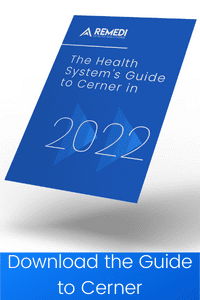The following is a guest article by Jenn Hamilton, MHA, RN, CPHIMS, VP of Clinical Informatics at ReMedi Health Solutions.
Disclaimer: I love Cerner. Sure, there are other EHRs that offer value like E… never mind. I won’t mention the other players in this battle for EHR glory. This is about Cerner; the good, the bad and the possible. That’s the whole point here, as EHR consultants, our focus is helping our clinicians provide the best care possible with a software that streamlines their workflows and aids in intelligent medical decision making. Beyond that, we help health systems make the most of this significant investment in all phases of the software lifecycle from system selection to the all-important optimization phase.
So, let’s discuss Cerner. All of it. Starting with the positive.
And be sure to download our full guide to Cerner for an even deeper dive.
 What Cerner Does Well
What Cerner Does Well
Solutions for specialties
Cerner does a fantastic job providing solutions for specialties. Cerner has carefully designed workflows that accommodate a wide array of medical specialties. These workflows include streamlined orders tailored to the specialist and documentation templates specific to their needs.
No sponsor organization necessary
With respect to the EHR ecosystem, Cerner makes it easy for organizations of all sizes and capacity to have access to a premiere software vendor. From the busy academic medical centers to the rural health clinic, Cerner has a model configured to meet those needs, while subsequently gaining access to a robust HIE. This means continuity of care for even the most remote patient populations.
Pricing is attractive over the long-term
Cerner doesn’t nickel and dime you for this and that feature. In fact, over the long-term, Cerner offers great value to health systems from an ROI perspective. Mainly, once implemented, there are several factors that provide value adds and cost savings for systems that work with Cerner.
IT works support
Small to mid-size organizations don’t often have the ability to maintain an on prem IT department or the geographical talent pool often needed to support a complex EHR solution. IT Works is Cerner’s solution to that dilemma. From upgrade and package maintenance to application management services, Cerner offers a wide array of solution support options to meet the needs of any organization.
Data Analytics & Reporting
Data. Where would healthcare be today without the data that’s been tracked over the years? Cerner puts that data in the hands of the organization, allowing them to align their care and vision with the changing currents of healthcare. A robust offering of standard reports is included with the solution, but there is no limit to the customized reporting and data analysis that is placed in the hands of the Cerner client. Optimization is driven by quantitative data, resulting in the ability to tackle inefficiencies head-on. Analytics can be provided at the enterprise level and drill down as far as the single clinician.
Visualizations, big metrics, comparative analytics
Data visualization, analytics, and comparative charts help you perform qualitative research which will in turn help you optimize Cerner usage at your health system. Cerner allows health systems to compare its own metrics to those of other systems that use Cerner. This community approach exemplifies the brilliance of data, sharing useful benchmarks and information.
Everyone wins when clinicians are empowered by their technology, and Cerner is certainly making the path to better healthcare clear for health systems.
Limitations & Things to Watch Out For
Life can’t just be full of sunshine and rainbows, right? There is not a software solution on the market today that doesn’t come with some downside, and that downside can differ from organization to organization. Pairing with a seasoned and knowledgeable consulting partner early in the process can help any organization tease out which EHR offering will ultimately serve them best.
Community Works vs. Millennium
When making the selection between Cerner Millennium and CommunityWorks, it’s important to understand the limitations and tradeoffs between the two options. Carpooling has many benefits, from cost savings and efficiency, but there are drawbacks like inconvenience and restrictive schedules. CommunityWorks is Cerner’s multi-tenant offering, allowing many health systems to share a single domain completely hosted and maintained by Cerner. This allows a critical access hospital to have access to a premier EHR. Even though there are limits on the ability to customize by the nature of being shared, it does provide a driver to push out standardization many health care systems strive for.
Configuration Options
With Cerner Millennium, there is an abundance of customizations to the system. When choosing CommunityWorks, the ability to customize is limited. An eyes wide open approach is best even during the planning phase regardless of the system. Again, choosing a consulting partner that is very familiar with both platforms is crucial and necessary right from the very start. There is a considerable amount of restriction the CommWx customer faces, and navigation through those waters can be tricky. In Millennium it is critical to reign in the customizations to prevent future upgrade maintenance issues. Teaming up with a partner that understands these issues and is knowledgeable in overcoming them leads to success.
You Need a Partner for Your Journey
Every step of a successful EHR journey is easier with help. Cerner has an extensive offering of support that includes client collaboration, education, workflow design tools and reference pages. Cerner can augment your IT Staff and offers a suite of robust, multi-tiered Application Management Services. Creating a partnership with a consulting company that has navigated the waters from system selection to optimization, is crucial to ensure your organization is getting the attention and customization needed to make the system uniquely yours. Many smaller organizations believe they can do this without that assistance. While it’s technically possible, a strong partnership ensures better decision making; combining an experienced partner with the core needs of the organization. Even with a Community Works model, there is a significant burden of work placed on a small and often reduced hospital team. Find a partner to assuage that burden and illuminate your journey at every turn.
Customizing Specialty-specific Workflows
It can be argued that while Cerner offers value within its specialty-specific workflows, the UX is not entirely customizable by specialty. Mainly, the interface is generally the same for all types of specialties, with subtle differences in order and note build. The system is intuitively designed for providers to effectively document care; however workflows may need to be adjusted to leverage configuration. Working with a knowledgeable partner can help foresee potential issues. Workflow walkthroughs are a critical step in the implementation process.
The Psychology of Change
There is a comfort in driving a car you’ve had for years, but there is typically an excitement when test driving a new one, complete with new technology and that new car smell. Once that new shiny car is purchased, you probably don’t want to rip out the leather seats and replace with the worn cloth ones from your last car, and yet, clinicians consistently try to replicate the processes from their last EHR and are very reluctant to embracing the new functionality and workflow changes necessary to ensure optimal use of the system. Of course, there are trade-offs and sacrifices, but Cerner is a sophisticated and capable system that can meet the needs of your organization. It will look different. It will push folks out of their comfort zone, but careful examination of the current process, a firm understanding of the desired future state, and trusted partners will help your clinical staff embrace the changes and be excited for the future. The change process can be done confidently with a strong Operational Readiness Program. The goal is to identify risks early on and mitigate those risks with input from the clinicians and providers.
A Recipe for Success
Our Approach
A common myth about Cerner is that you won’t need consulting services to help with the implementation. While Cerner is generally a straightforward implementation, you want a clinical partner on your side. A partner that understands Cerner AND your clinical workflows. This need is even more crucial in small organizations, as that staff is wearing as many hats as will fit on their heads and don’t have the knowledge or the bandwidth needed to be successful. The minimal cost of a consulting partner maximizes the ROI on your EHR investment for years to come.
ReMedi’s Physician Executive team can be reached at info@remedihs.com. We have a full portfolio of services that will ensure a successful implementation and help your organization build a trusting and collaborative relationship with Cerner.
Read In-Depth: The Health System’s Guide to Cerner in 2022
Our team at ReMedi Health Solutions put our heads together and created a comprehensive guide designed for health systems that are evaluating Cerner as an EHR, as well those that are optimizing their live system. We uncover a roadmap full of key initiatives that yield repeated success for our clients on Cerner.
 About Jenn Hamilton, MHA, RN, CPHIMS
About Jenn Hamilton, MHA, RN, CPHIMS
Jenn is a driven healthcare leader with a focus on clinical strategy, informatics, and enterprise technology. Formerly an ER nurse, Jenn has over a decade of experience working directly with healthcare executives on EMR implementation and optimization projects. Having served in several roles within the clinical setting including Nurse, EHR Program Director, and Clinical Strategist, Jenn is passionate about improving the safety and well-being of patients and playing an instrumental role in the development and completion of EHR/EMR systems. At ReMedi, Jenn helps organizations assess operations at every level, and designs and develops change strategies that improve the delivery of healthcare. Jenn can be reached via LinkedIn or email at j.hamilton@remedihs.com.













